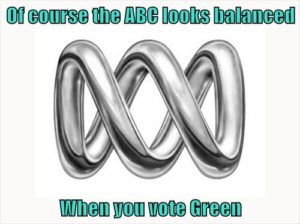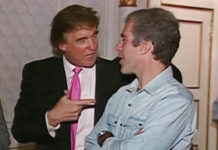Bradly Billings
Life lesson one, for the teary journos over at the ABC, and the keyboard smashing tantrum throwers at Fairfax – your Twitter feed is not the electorate. And that, ladies and gentlemen, is also at least partly why Donald Trump is President-elect of the United States of America. Of course, it’s not that simple, although in some ways it is. Twitter is surely a Green-Left echo chamber, a lot like what passes for ‘debate’ on the ABC, where each ‘expert guest’ agrees with each other, and the host, on the handful of social issues that so obsess taxpayer funded media types – gay marriage, asylum seekers, Trump is Satan, and so on. The astonishment and distress at Fairfax, the ABC, SBS, etc., will be real and genuine. One hopes they have a good EAP.
That a candidate like Donald Trump, with no real political experience, a problematic past record of behaviour, and a penchant for saying outrageous things, is the next President of the United States is not something that has happened in isolation, but an event, even if a surprising one, loosely connected to other unexpected electoral outcomes around the Western world – in Britain, the Brexit referendum, and here in Australia the political resurrection of Pauline Hanson. Whilst commentators and poll watchers generally conceded that Pauline herself was a good chance to win a seat, not many expected her party to gain half a million votes around the nation, ending up with not one, but four senators.
Much of the resulting political analysis in this country, since the federal election, has missed, glossed over, or even denied what is, in my view, the single most significant reasons for the rise of Trump in the United States, Brexit in the United Kingdom, and Pauline Hanson’s revival here in Australia – this is the emergence of a new form of social elitism that looks down at the vast majority of the people around them through a patronising and paternalistic lens. The new elitism is nurtured on university campuses, where ‘trigger warnings’ and ‘safe spaces’ protect seemingly delicate students from unwelcome ideas, whilst social concepts such as gender fluidity, male culpability, and white privilege are pressed on young minds. Such theories, once confined to the more exotic electives in Arts faculties, are now even being inflicted on primary and secondary schools through programs like Safe Schools and Building Respectful Relationships. From this sheltered environment come the nation’s politicians, assorted professionals, journalists and media presenters – the leaders, influencers, and opinion makers of today, and of the future; in short the elites. One only needs turn a few pages over of The Age or Sydney Morning Herald, with its all but hysterical coverage of the Trump phenomena, or sit through an episode or two of Q&A, The Drum, or Insiders over at the ABC (if you can bear it), to see how entirely the elitist narrative has captured large swathes of the nation’s media.
The social elites cohere around some non-negotiable positions on various social and public policy matters that have taken root and become entrenched in social and political discourse across the Western world. Those who question them, or who even raise doubts about them , are immediately shouted down as racists, bigots, sexists, misogynists, Islamophobes, and homophobes, and silenced by a variety of means – through social shaming, through frequently vitriolic and abusive social media campaigns, and more insidiously, by being pursued through the Courts by taxpayer funded bodies like the Human Rights Commission.
One of the few really and genuinely honest things Hillary Clinton said during the US election campaign was that she considered a large number of the supporters of her opponent, Donald Trump, to be ‘deplorables.’ So sheltered is the social and political world in which Hillary, and those elites like her exist, that it seemed not to occur to her, until it was pointed out by her opponents and no doubt advisers the following day, that this encompassed quite literally millions of her fellow Americans. In Britain similar statements have been made about those who supported Brexit, characterising them en masse as xenophobes. Here in Australia, the Greens Party demonstrated the same elitist contempt by staging an orchestrated walkout of the Senate chamber when Pauline Hanson rose to speak, seemingly oblivious to the fact that half a million Australians had voted to put her in the Senate.
Loathe her all you wish, but by treating her with such contempt and scorn, you are so treating the many who voted for her. Of course this is entirely lost on self-serving narcissists like the Greens who, hilariously, also claim to be a political party respectful of and committed to ‘listening’ to the people in the community, and to values like diversity and social inclusion. The fraud they seek to perpetuate is plain for all to see, and familiar to any student of socialist fantasies past and present – they really mean, of course, people in the community who agree with us – the rest are irrelevant at best, and for the Gulag at worst.
Anyone who wonders about, and struggles to understand, the rise of Trump, Hanson, and Brexit, should spend an hour in the front bar of a pub somewhere in the suburbs – well beyond the trendy inner suburbs, where the punters read the sports pages first, and like most Australians have never watched anything on the ABC or SBS; do not, and never will, belong to a trade union (unlike most of the Australian Labor Party); and in contrast to many of those in the Liberal Party, have never seen the inside of a court room other than perhaps as the defendant. Most of the drinkers at the front bar will hold ordinary jobs, and live in ordinary suburban streets, lined by ordinary brick veneer houses, and will be working hard to pay down the mortgage and send the kids to school. They may not be politically sophisticated or even aware, but they know one thing – they sometimes agree with Trump, or Hanson, or with the concerns about immigration expressed by them, and on morning television by people like Sonia Kruger, for instance.
 What the elites fail to see is that, when those sometimes uncomfortable and unfashionable views, and the people who express them, are mercilessly mocked, ridiculed, and shouted down as racist, or phobic , or deplorable, is this – so too are the punters in the front bar who share them, even if only sometimes. In their smugness, the elites seemingly fail, time and time again, to see and understand that the contempt they hold for speech and for opinion that is not welcome in the safe spaces they inhabit, is experienced by large numbers of the community as utter contempt for them. One commentator on the ABC (of course) summed this up beautifully by describing millions of her fellow citizens as ‘mindless wage slaves.’ I suppose it is easy to assume your political views to be a majority one when everyone on Twitter, and all of your Uni mates, and the guy you order tofu from, all share the same disdain and smug contempt for those mindless wage slaves too; without for a moment, of course, having the self- awareness to recognise you draw a salary courtesy of the taxes paid by those same wage slaves.
What the elites fail to see is that, when those sometimes uncomfortable and unfashionable views, and the people who express them, are mercilessly mocked, ridiculed, and shouted down as racist, or phobic , or deplorable, is this – so too are the punters in the front bar who share them, even if only sometimes. In their smugness, the elites seemingly fail, time and time again, to see and understand that the contempt they hold for speech and for opinion that is not welcome in the safe spaces they inhabit, is experienced by large numbers of the community as utter contempt for them. One commentator on the ABC (of course) summed this up beautifully by describing millions of her fellow citizens as ‘mindless wage slaves.’ I suppose it is easy to assume your political views to be a majority one when everyone on Twitter, and all of your Uni mates, and the guy you order tofu from, all share the same disdain and smug contempt for those mindless wage slaves too; without for a moment, of course, having the self- awareness to recognise you draw a salary courtesy of the taxes paid by those same wage slaves.
The Trump ascendancy is, on one level, risky, perhaps dangerous, and most of all unpredictable – no one knows what he is going to or not do, nor how he is going to use the immense power to be handed to him in January next year. On another level, it is magnificent and exhilarating – for it represents a real and genuine strike through the heart of the politically correct narrative that has been like a jackboot on the neck of free speech for decades now, and a repudiation of identity politics, with its culture of perpetual victimhood and offence taking. The people, largely the ‘little’ and ordinary people, who would have been called in other times the ‘working classes,’ have spoken, and they will be heard. Even as the elites are sitting at their keyboards with their fingers in their ears, refusing to listen.
The Right Reverend Dr Bradly Billings is an Assistant Bishop in the Anglican Diocese of Melbourne, Australia. He has recently published ‘For God, King and Country,’ a study of the Anglican Church and Community during the First World War.









